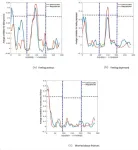(Press-News.org) The U.S. government could save taxpayers between $228 million-$2.15 billion a year if insurers who operate its Medicare Part D plans purchased seven generic oncology drugs at the same prices obtained by the Mark Cuban Cost Plus Drug Company (MCCPDC), according to a study published today in the Journal of Clinical Oncology,
The Vanderbilt University Medical Center (VUMC) study, led by Ruchika Talwar, MD, a urologic oncology fellow, estimated potential savings by switching to MCCPDC prices with the implication that Medicare, Part D plan sponsors and beneficiaries are likely overpaying for these self-administered generic oncology drugs.
“Both doctors and patients should be aware of cash-pay options available that might offer lower prices to beneficiaries purchasing outside of their health plans and the impact that this drug price stewardship could have on Medicare and Part D sponsors,” Talwar said. “These findings are of utmost importance.”
It is the second VUMC study in the last year to examine cost savings by purchasing through the MCCPDC. A previous Journal of Urology study led by Talwar estimated that taxpayers could save could save patients $1.29 billion a year based on 2020 Medicare Part D expenditures on just the nine most popular urological drugs.
Founded in January 2022 by Cuban and Alexander Oshmyansky, MCCPDC sells hundreds of generic drugs using a cost+15% pricing strategy, a $3 pharmacy fee, and a $5 maximum shipping cost per 30-day, 60-day or 90-day prescription.
Study authors obtained public formulary data from MCCPDC that identified the seven generic oral oncology drugs offered by the company — abiraterone, anastrozole, imatinib (100 mg and 400 mg), letrozole, methotrexate, raloxifene and tamoxifen — their dosages, and associated prices offered in December 2022, finding a potential savings of $661.8M (78.8%) if median Medicare Part D unit prices were replaced by MCCPDC prices.
Total savings ranged from $228.1M (56.1%) to $2,154.5M (92.4%) when assuming plan prices were equal to the 25th or 75th percentiles of Q3-2022 Part D plan unit prices.
The drug abiraterone (brand name Zytiga) is used in combination with prednisone to treat a certain type of prostate cancer that has spread to other parts of the body. Study authors calculated its median cash-pay price at $562.49, in comparison to a 30-day prescription offered under the MCCPDC model at $44.60.
The median price for the cancer growth blocker imatinib 100 mg (brand name Gleevac) was $442.32 and 400 mg at $1,480.29, as compared to imatinib 400 mg at $44when purchased under the MCCPDC model.
“The MCCPDC is one of several companies that aim to address a real problem for consumers – the costs of generic drugs,” said co-author Stacie Dusetzina, PhD, professor of Health Policy. “This study highlights that, in some cases, Part D plans and their pharmacy benefits managers aren’t doing a good enough job at getting favorable prices for generic drugs for Medicare and its beneficiaries. In some cases, we find that Medicare beneficiaries would overpay by a lot if they used their Medicare benefit to fill one of these cancer drugs. That shouldn’t happen.”
Other median cash-pay prices under Q3-2022 Medicare Part D for a 30-day prescription were: anastrozole $11.18, letrozole $12.02, methotrexate $23.75, raloxifene $44.55 and tamoxifen $17.94.
Other cash-pay prices under the MCCPDC model for a 30-day prescription were: anastrozole $10.70, letrozole $10.70, methotrexate $15.80, raloxifene $11.60 and tamoxifen $14.90.
Median savings for each drug using Part D plan unit prices were: abiraterone $338.0M [$143.2M to $1,032.2M], anastrozole $1.2M [-$13.7M to $23.2M], imatinib 100 mg $15.6M [$5.2M to $67.4M], imatinib 400 mg $212.0M [$70.4M to $866.6M], letrozole $1.9M [-$4.6M to $10.1M], methotrexate $26.7M [$5.0M to $61.1M], raloxifene $63.8M [$26.9M to $85.3M], and tamoxifen $2.6M [-$4.2M to $8.6M]
Talwar said she hopes future studies will continue to spread awareness to patients and physicians about MCCPDC, to hopefully ease the burden of financial toxicity and improve access to essential cancer medications.
END
Study finds Mark Cuban’s cost plus drug company could save taxpayers millions on Medicare generic oncology drugs
2023-06-08
ELSE PRESS RELEASES FROM THIS DATE:
Hallucinogen use other than LSD on the rise among young adults
2023-06-08
ANN ARBOR—Young adults ages 19 to 30 nearly doubled their past 12-month use of non-LSD hallucinogens in the United States from 2018 to 2021, according to a study by the University of Michigan and Columbia University.
In 2018, the prevalence of young adults' past-year use of non-LSD hallucinogens was 3.4%. In 2021, that use increased to 6.6%.
"While non-LSD hallucinogen use remains substantially less prevalent than use of substances such as alcohol and cannabis, a doubling of prevalence in just three years is a ...
Seaweed farming may help tackle global food insecurity
2023-06-08
To help solve hunger and malnutrition while also slowing climate change, some farmers could shift from land to sea, suggests a recent study from the Friedman School of Nutrition Science and Policy at Tufts University. The study was published in Global Food Security.
Producing and selling seaweed could boost incomes for farmers in low- and middle-income countries (LMICs), particularly in coastal regions of Africa and Southeast Asia, said Patrick Webb, the Alexander McFarlane Professor of Nutrition at the Friedman School and senior author of the study. The other ...
Pritzker Molecular Engineering researchers “split” phonons – or sound – in step toward new type of quantum computer
2023-06-08
When we listen to our favorite song, what sounds like a continuous wave of music is actually transmitted as tiny packets of quantum particles called phonons.
The laws of quantum mechanics hold that quantum particles are fundamentally indivisible and therefore cannot be split, but researchers at the Pritzker School of Molecular Engineering (PME) at the University of Chicago are exploring what happens when you try to split a phonon.
In two experiments – the first of their kinds – a team led by Prof. Andrew Cleland used a device called an acoustic beamsplitter ...
Robotic vehicles fight dengue-carrying mosquitos in Taiwan sewers
2023-06-08
Unmanned ground vehicles can be used to identify and eliminate the breeding sources of mosquitos that carry dengue fever in urban areas, according to a new study published this week in PLOS Neglected Tropical Diseases by Wei-Liang Liu of the Taiwan National Mosquito-Borne Diseases Control Research Center, and colleagues.
Dengue fever is an infectious disease caused by the dengue virus and spread by several mosquito species in the genus Aedes, which also spread chikungunya, yellow fever and zika. Through the process of urbanization, ...
Reversing age-related taurine loss via supplementation improves mouse longevity and monkey health
2023-06-08
Taurine deficiency may be a driver for aging, according to a new study, which evaluated the amino acid’s effect on health and longevity across several animal models. According to the authors, reversing age-associated taurine loss via supplementation improved the healthy lifespan in worms, rodents, and non-human primates – findings that warrant further human trials to examine taurine’s effect on healthy lifespan in humans and the potential risks involved. Taurine – a semi-essential micronutrient – is one of the most abundant amino acids in animals. Previous studies in several species have shown that taurine deficiency during early life causes functional ...
2020’s COVID-19 lockdowns altered mammal movements worldwide
2023-06-08
Reduced traffic and human mobility during the 2020 COVID-19 lockdown restrictions rapidly altered some mammals’ movement behaviors, according to a new study. The findings illustrate how human activities constrain animal movement and how they react when those activities cease, which provides valuable insight into future conservation strategies designed to improve human-wildlife coexistence. During the initial global outbreak of COVID-19 in 2020, governments worldwide introduced lockdown measures to curb the spread of the virus, resulting in a drastic reduction in human mobility and vehicular traffic. This “anthropause,” as it’s come to be known, ...
Some intestinal T cells can hinder cancer immunotherapy, while others can enhance it, finds a new pair of studies
2023-06-08
Two new studies in Science and Science Immunology spotlight a group of intestinal T cells with α4β7 integrin receptors that could be targeted to prevent resistance to immune checkpoint blockade (ICB) cancer immunotherapy. Both studies were conducted in mice and corroborated in samples from patients.
In the Science study, Marine Fidelle and colleagues evaluated how interactions between antibiotics, the gut microbiome, and α4β7+ CD4+ T cells promote ...
Climate underlies African forest and savanna biomes
2023-06-08
Coupled field observations and phytoclimatic modeling show that the distribution of African forest and savanna ecosystems are highly predictable by climate, researchers report in a new study. The findings suggest that the effects of climate change on the distribution of African forests and savanna may be more easily forecasted than previously recognized. An important yet challenging goal for ecological science is predicting how global vegetation patterns will be altered by ongoing climate change. Generally, the distribution of Earth’s vegetation biomes is determined by climate. However, at local or regional ...
Wild mammals moved farther during severe COVID-19 lockdowns
2023-06-08
Tucker and 174 colleagues, including members of the COVID-19 Bio-Logging Initiative, analysed global data from land mammals tracked by GPS devices. Tucker: “There were many media reports that nature was recovering during those first lockdowns. For example, cougars were roaming the streets of Santiago, Chile, but we wanted to know: is there any evidence of this? Or were people simply paying more attention to everything while being at home?”
Movements of mammals
Tucker and colleagues collated ...
Study: Southern states may have borne brunt of COVID-19 mental health impact
2023-06-08
LAWRENCE — A new study appearing today in the peer-reviewed journal PLOS ONE shows how federal and state lockdowns and health mandates implemented to curb the spread of COVID-19 affected the mental health of people living in four U.S. geographic regions and affiliated with two major political parties.
A group of faculty, staff and student researchers at the University of Kansas generated data-based maps to look for spatial trends and communities with similar mental health and COVID-19 outcomes. ...


